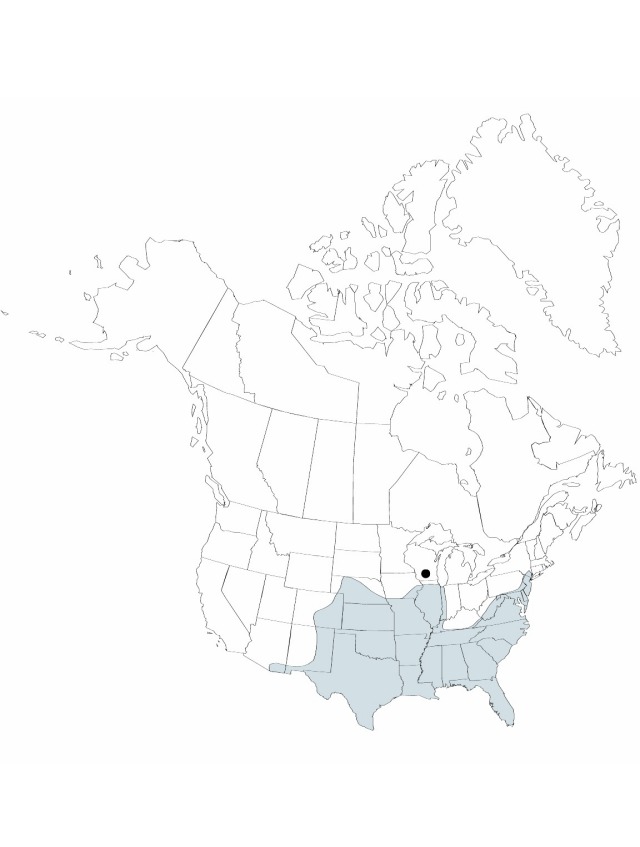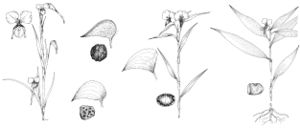Commelina erecta
Sp. Pl. 1: 41. 1753.
Herbs, perennial. Roots fleshy, stout, tufted. Stems cespitose, usually erect to ascending (rarely decumbent, rooting at nodes). Leaves: leaf sheath auriculate at apex; blade sessile or petiolate, linear to lanceolate (rarely lanceolate-ovate), 5–15 × 0.3–4 cm, apex acuminate (rarely acute). Inflorescences: distal cyme vestigial, included; spathes solitary or clustered, green, pedunculate, not at all to strongly falcate, 1–2.5(–4) × 0.7–1.5(–2.5) cm, margins longly connate, glabrous except along connate edge, apex acute to acuminate, sometimes purple, usually variously pubescent; peduncles 0.5–1(–2) cm. Flowers bisexual and staminate, 1.5–4 cm wide; proximal petal minute, white, distal petals blue (rarely lavender or white); staminodes 3, staminodes and medial stamen entirely yellow; antherodes cruciform. Capsules 3-locular, 2-valved (very rarely 3-valved), 3.5–4.5 × 3–5 mm; abaxial locule warty, indehiscent (very rarely smooth and dehiscent); adaxial locules smooth, dehiscent. Seeds 3, brown, with soft, whitish tissue at both ends or in a band, 2.4–3.5 × 2.3–2.8 mm, nearly smooth. 2n = 60.
Phenology: Flowering spring–fall.
Habitat: Rocky woods and hillsides, scrub oak woods, pine woods and barrens, sand dunes, hummocks, shale barrens, roadsides, railroad rights-of-way, fields, and occasionally a weed in cultivated ground
Distribution

Ala., Ark., Ariz., Colo., Del., D.C., Fla., Ga., Ill., Ind., Iowa, Kans., Ky., La., Md., Miss., Mo., Nebr., N.C., N.J., N.Mex., N.Y., Okla., Pa., S.C., Tenn., Tex., Va., W.Va., Wis., Central America.
Discussion
Commelina erecta grows in temperate regions of North and Central America, as well as in tropical regions.
This is by far the most variable species of Commelina in the flora. Three freely intergrading varieties may be recognized, although they are of questionable significance: C. erecta var. erecta, with larger leaves lanceolate to lanceolate-ovate, (1.5–)2–4 cm wide, and spathes (2.2–)2.5–3.6 cm, occurs throughout our region; C. erecta var. angustifolia (Michaux) Fernald, with leaves linear to narrowly lanceolate, 0.3–1.5 cm wide, and spathes 1–2 cm, is mainly southern but extends as far north as Virginia; and C. erecta var. deamiana Fernald, with leaves linear to narrowly lanceolate, 0.5–1.7 cm wide, and spathes 2–3.5 cm, occurs in midwestern United States south to Texas.
Selected References
None.
